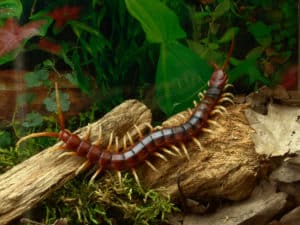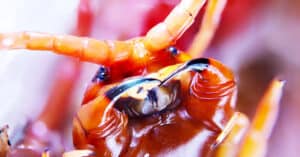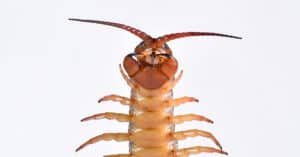House centipedes are one of the most common species of centipede. There are around 3,000 species of centipedes currently discovered, with an estimated 5,000 more that could exist. The house centipede is the species you will most likely come across; they have a habit of finding their way into people’s homes, as their name suggests.
Like other centipedes, they prefer dark moist habitats. Insects are what they are mainly attracted to, and why homes with a bug problem will also have a house centipede problem.
If you have house centipedes in your home then you may have wondered – do house centipedes bite. If so, are their bites fatal or mild? Let’s find out about the nature of a house centipede’s bite here.
How Painful Is A House Centipede Bite?
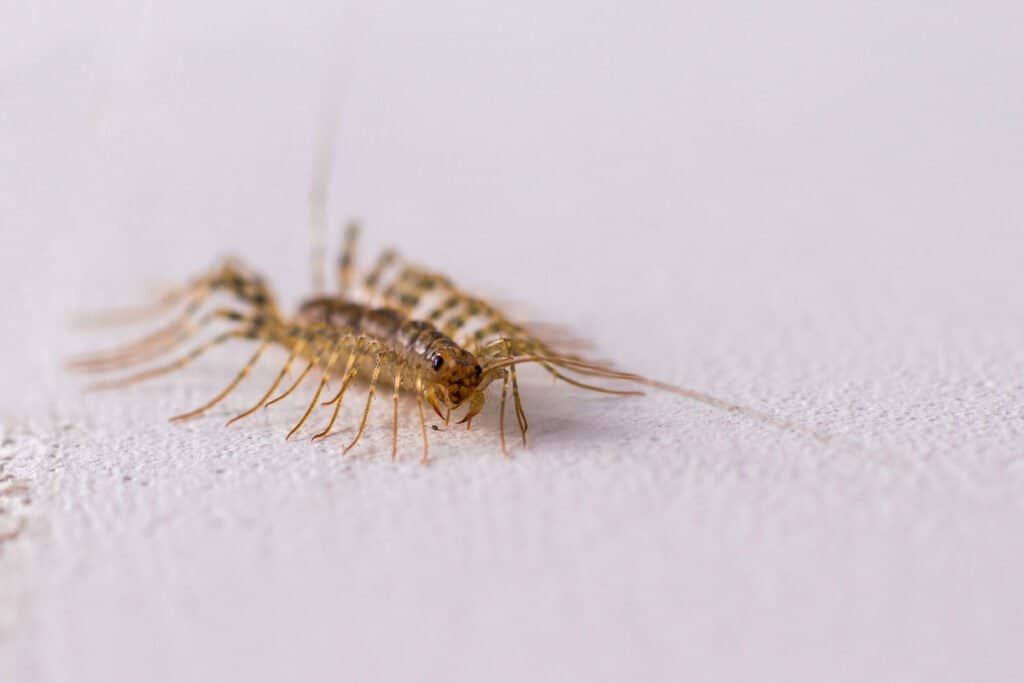
Although painless in most cases, the bite from a house centipede might cause some discomfort.
©Igor Nikushin/Shutterstock.com
Do house centipedes bite? Unfortunately, yes. The bite from a house centipede is not generally painful but pain will vary on the individual. Their bite is similar to the pain of a bee sting. If you are more sensitive to their venom then you may experience more severe side effects. Death from centipede bites generally does not occur, but bites do come with side effects.
People who get bitten by a house centipede may experience swelling, nausea, redness on the bite, headache, chest pain, and vomiting. For most a bite is harmless and just comes with slight discomfort. It is rare when a house centipede bite results in severe side effects. People with allergies to their venom will experience greater effects.
Treating A Bite From A House Centipede?
Unless you are experiencing severe symptoms, treating a house centipede bite can be done easily from home. When bitten, redness and pain in the affected area are some of the symptoms you will experience.
A heat or cold compress will help reduce the swelling and relative pain. Ointment and anti-inflammatory medicine can also be applied to the bite area to help soothe the pain.
If you are allergic to a house centipede bite, then taking an allergy medicine will also help to treat a bite. The side effects from a bite are mild for some people and may need no treatment.
It usually takes around 48 hours for the side effects of a bite to go away. If you are having any severe issues from a centipede bite then a doctor’s visit is recommended and can help speed up the recovery process.
Preventing a House Centipedes Bite.
Do centipedes bite if left alone? Bites from the house centipede are rare, but still possible. They are more likely to bite if provoked. If you see a house centipede don’t pick one up with your bare hands. Instead, use a container to take it outside. Rather than getting rid of them, some people believe in using them as a natural way to eliminate unwanted bugs in the home.
Centipedes including the house centipede are nocturnal, so you will likely come across them at night. During the day they will rest in dark moist shelters, and venture out when the night comes.
If you have house centipedes in your home you should always use a flashlight, or turn on lights to avoid accidentally provoking them. Bites can happen when you least expect them, especially when you accidentally bump into one.
If you have small children or pets then getting rid of them in your home may be the best option. Pets and children are curious, and may accidentally get themselves in an unwanted situation. Getting rid of house centipedes is easy, and one of the best ways to prevent bites from happening.
Eliminating House Centipedes In Your Home
If you are having trouble with house centipedes then there are easy steps to take to prevent them from living in your home. House centipede bites will occur more often when there is a large population of them. Knowing what attracts these centipedes will help get rid of them, and make your home more comfortable.
Ways to prevent house centipedes:
- Getting rid of their food source
- Sealing holes and possible entryways
- Removing debris and areas where they can hide
- Using scents or insect spray
Using these tips you should be able to reduce their numbers and prevent any more bites from occurring.
Getting Rid Of the House Centipedes food
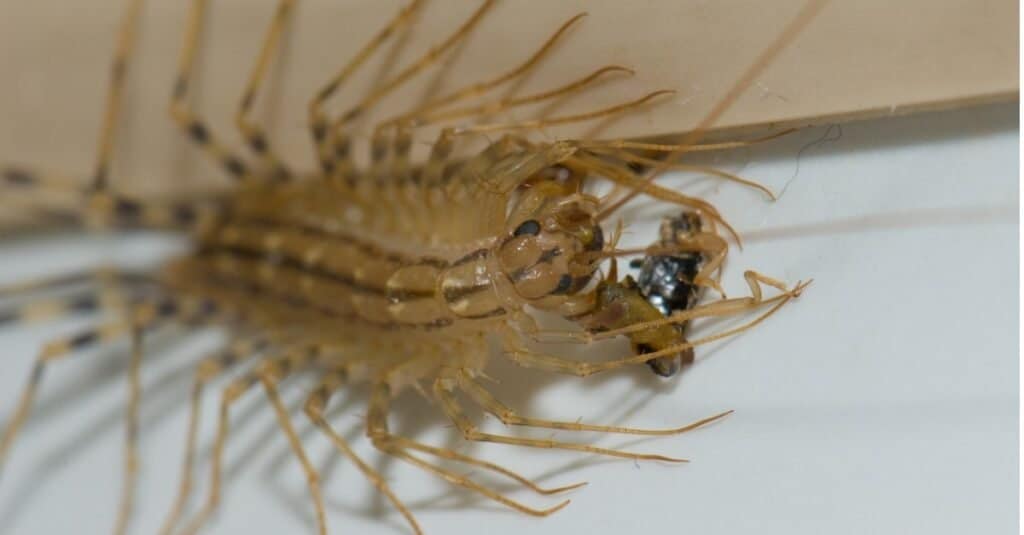
Getting rid of prey-insects in your home is one way to prevent an invasion of house centipedes.
©iStock.com/Víctor Suárez Naranjo
The main reason house centipedes will your home is to search for food. Homes with an infestation already will attract more of these animals thus making a house centipede bite more likely. Centipedes are carnivorous and will be attracted to insect-infested homes.
Some of the prey that they feed on are spiders, bed bugs, earwigs, silverfish, crickets, moths beetles, and other small invertebrates. You can use these species as a way to help battle your insect problem, but getting rid of the pests in your home will also help discourage them from living inside.
Sealing Holes and Entry Ways
House centipedes have tiny worm-like bodies that can enter your home through small crevices or holes. If you don’t have a population of centipedes living in your home, they may still find their way in. Centipedes’ large number of legs help them push their ways through the tiniest of spaces. They may also use crevices in the bathroom to hide out during the day. Sealing areas like these will stop further pests from entering thus making a house centipede bite less likely.
Using Repellent
Repellent can be used to get rid of centipedes and stop them from making your home theirs. Natural oils like tea tree, cedar, and lavender oil are natural ways to repel them from your home. Strong smelling essential oils will work on getting rid of centipedes and other pests like rats, roaches, and spiders.
House centipedes can be beneficial to your home, but their bite may make you want to limit their presence. Although not very painful, their bite can cause some discomfort. Reducing their numbers in your home will help prevent future bites, and let them continue to feast on other insects outside.
The photo featured at the top of this post is © Dilcoe at English Wikipedia, Public domain, via Wikimedia Commons – License / Original
Thank you for reading! Have some feedback for us? Contact the AZ Animals editorial team.




